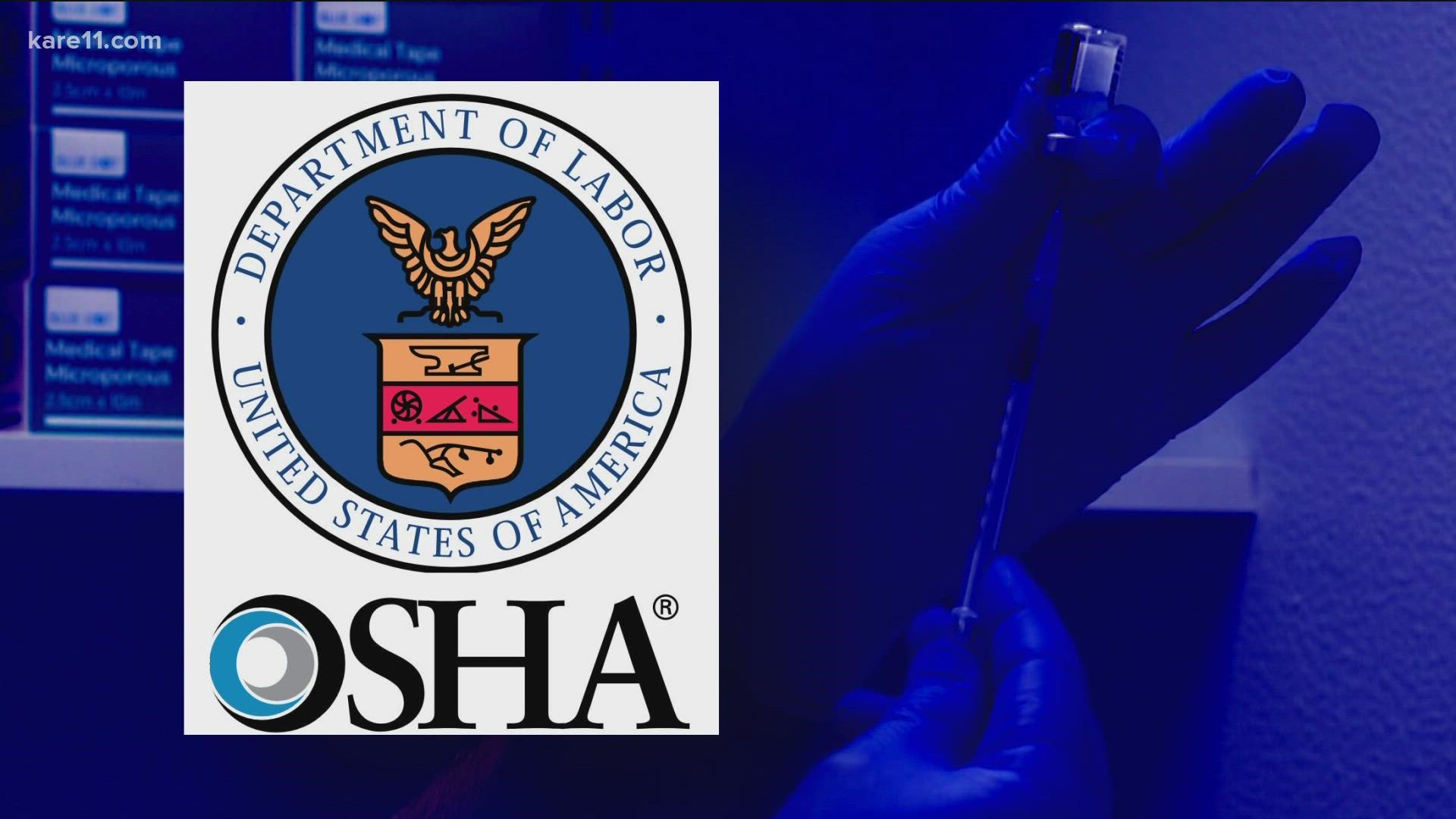MINNEAPOLIS — The Biden administration and the Department of Labor on Thursday announced a Jan. 4 deadline for private companies with 100 or more workers to comply with a vaccine mandate, impacting several thousand Minnesota companies under an Emergency Temporary Standard.
According to a spokesperson for Minnesota Department of Employment and Economic Development (DEED), 4,796 companies across the state fit the size qualifications for the mandate. In turn, those companies employ more than 1.4 million people combined.
Starting Jan. 4, companies could face thousands of dollars in fines from OSHA if they fail to comply with the emergency order, which forces workers to either get vaccinated or face weekly testing and masking requirements. The Biden administration is also separately requiring vaccinations for health care workers in Medicare and Medicaid facilities, as well as federal contractors.
David Larson, a labor law expert and professor at Mitchell Hamline School of Law, said in the case of compelling private employers to require vaccines, the Biden administration is relying on the Occupational Safety and Health Act of 1970 that obligates employers to provide a safe workplace.
"Further into the act, there's also a 'grave danger' clause, that says that when workers are exposed to 'grave dangers,' we can act immediately, to create different kinds of regulations to protect workers. So, that's where that authority is coming from," Larson said. "The reason why we're having this mandate is because this pandemic is not going away."
About 80% of American adults have received at least one dose of the vaccine, according to federal data.
However, several prominent business groups – including the Minnesota Chamber of Commerce – say they're worried the vaccine mandate for larger private employers will drive the remaining unvaccinated adults from the workforce.
"We have worker shortages in really all industries, all sectors across Minnesota in all four corners of the state," said Vicki Stute, the Minnesota Chamber of Commerce's VP of Programs and Business Services. "So, a mandate such as this certainly could impact that in an even more negative light."
Stute said businesses have peppered the Minnesota Chamber of Commerce with questions since Biden first made his announcement in September, focusing largely on the labor market and whether the mandate would lead to more costs and administrative burdens. Although the guidance issued Thursday will not make companies pay for unvaccinated workers' weekly COVID-19 tests, some in the business community remain skeptical of the emergency rule, and several Republican governors have already vowed to sue.
"We believe employers should have the autonomy to make these types of decisions for their employees," Stute said. "This type of mandate certainly is an interference in the private sector."
Many of the top retailers in the U.S., including Minnesota-based Target, have not yet publicly reacted to the vaccine mandate for larger employers. Target's media team did not respond to KARE 11's inquiries on Thursday, nor did General Mills, Cargill, or Hormel. A spokesperson for U.S. Bank, meanwhile, said "we're still interpreting the new rules and determining how we are going to move forward."
However, 3M confirmed it will comply with federal mandates, and an EcoLab spokesperson said it will require "all U.S. associates have the necessary shots to be fully vaccinated, or have an approved accommodation, by Tuesday, Jan. 4, to help protect their health, our team, our customers and the public," adding that 80% of its U.S. workers are already vaccinated anyway.
The key question now is how OSHA will enforce these vaccine mandates for employers with at least 100 workers. Inspectors can either investigate companies on their own accord or look into complaints from workers.
"It's not going to be easy, because of the breadth of this," the labor law expert David Larson said. "There are so many employers that are going to be affected and so many millions of workers. So, to some degree, we are going to depend on the employers to do it."
Larson said he thinks many private companies will quietly welcome Biden's order, since they'll be able to blame the government if workers don't want to cooperate with the federal mandate.
He pointed to the fact that the U.S. Chamber of Commerce is not objecting to the guidance issued Thursday. The national chamber praised the Biden administration for setting a Jan. 4 deadline after the holiday shopping season.
"For the vast most part, the employers are not protesting this," Larson said. "And, now, they have an excuse for actually enforcing it."

